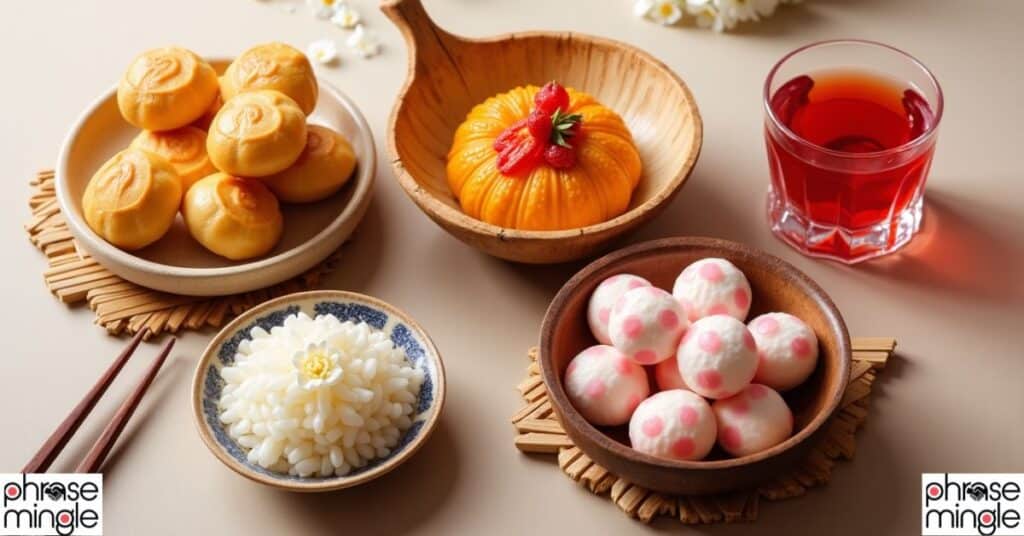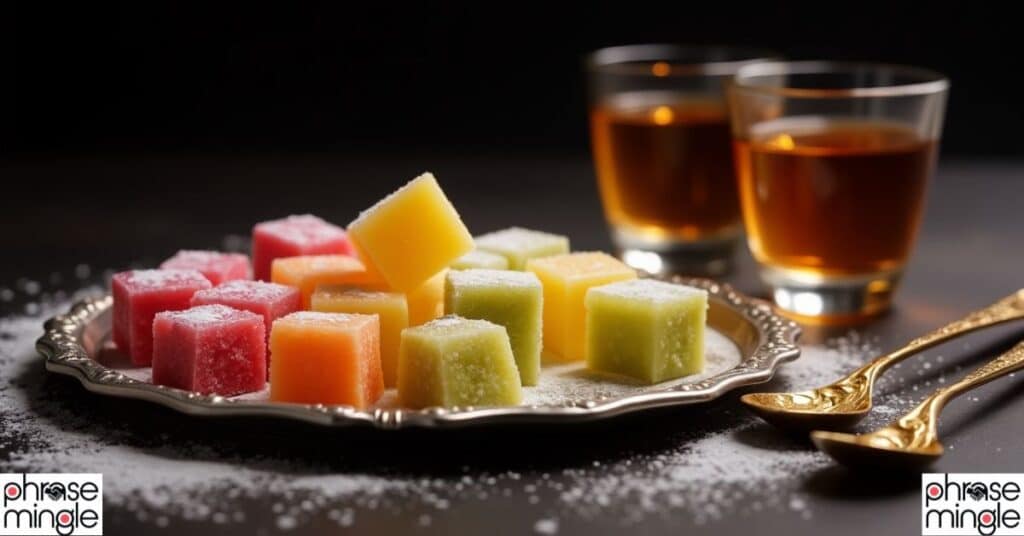When you’re craving something sweet, desserts that start with T offer an incredible journey through global cuisines. From Italy’s classic tiramisu to Thailand’s popular thapthim krop, these delightful desserts reflect centuries of culinary tradition from around the world.
This comprehensive guide explores 110 T desserts that’ll expand your dessert vocabulary and inspire your next baking adventure. Whether you’re a professional pastry chef or a home baker, this list of desserts represents the incredible diversity found in the world of sweets.
Why T-Desserts Deserve the Spotlight
The letter T launches an extraordinary collection of desserts beginning with T. These treats span every texture imaginable – from silky custards to crispy cookies, from layered cakes to frozen delights. What makes T letter desserts particularly fascinating is their cultural significance across different societies.
Key Statistics:
- Over 50 countries contribute to this collection
- Recipes range from 12th-century origins to modern innovations
- Preparation times vary from 15 minutes to several days
- Temperature serving ranges from frozen (-10°F) to warm (180°F)
The Global Sweet Journey: What Makes T-Desserts Special
T starting desserts tell stories of migration, trade routes, and cultural exchange. When Marco Polo brought sugar techniques from Asia to Europe, he unknowingly influenced today’s tarte tatin. Similarly, colonial trade routes explain why tembleque appears in both Caribbean and Mediterranean cuisines.
These desserts starting with T also demonstrate how local ingredients shape regional variations. Japanese taiyaki uses sweet red bean paste, while American versions might feature chocolate or custard. This adaptability makes T-desserts incredibly versatile for modern kitchens.
The Complete Collection: 110 T-Desserts Categorized
Ready to explore a treasure trove of treats? Below is the complete collection of 110 desserts that start with T, thoughtfully categorized for easy browsing. Whether you’re hunting for traditional favorites or unique finds, this list has something sweet for every craving.
Classic European Elegance (25 desserts)
Italian Masterpieces

Tiramisu remains the crown jewel of Italian desserts that start with letter T. This coffee-soaked masterpiece combines mascarpone cheese, ladyfingers, and cocoa powder. Traditional recipes require 24-hour refrigeration for optimal texture development.
Torta Caprese originated on the island of Capri during the 1920s. This flourless chocolate-almond cake contains no wheat, making it naturally gluten-free. Professional bakers achieve its signature cracked top by carefully controlling oven temperature.
Tartufo translates to “truffle” in Italian, reflecting its irregular, rustic appearance. This frozen dessert combines gelato with chocolate sauce, then rolls in cocoa powder or chopped nuts. Sicilian versions often include candied fruits.
| Italian T-Dessert | Origin Century | Key Ingredient | Serving Temperature |
|---|---|---|---|
| Tiramisu | 17th | Mascarpone | Chilled (40°F) |
| Torta Caprese | 20th | Almonds | Room temp |
| Tartufo | 16th | Gelato | Frozen (10°F) |
French Sophistication

Tarte Tatin emerged from a happy accident at Hotel Tatin in 1889. The upside-down apple tart requires precise caramelization techniques. Professional pastry chefs recommend using firm apples like Granny Smith to prevent mushiness.
Tuile cookies get their name from French roof tiles, which they resemble. These delicate wafers must be shaped while warm – they become brittle within minutes of cooling. Master bakers often use specialized tuile molds for consistent results.
British Traditions
Treacle Tart gained fame as Harry Potter’s favorite dessert, but its origins trace back to the 1880s. Golden syrup creates the signature glossy filling, while breadcrumbs provide texture. Traditional recipes call for lemon juice to balance sweetness.
Trifle represents British layered dessert mastery. Victorian-era recipes specified precise layering orders: sponge cake, custard, fruit, and cream. Modern variations include chocolate, coffee, or seasonal fruit themes.
Asian Delicacies & Innovations desserts

Japanese Artistry
Taiyaki fish-shaped pastries originated in Tokyo during the Meiji era (1868-1912). Traditional fillings include sweet red bean paste (anko), but modern versions feature chocolate, custard, or seasonal flavors. Street vendors use specialized cast-iron molds for authentic texture.
Tokyo Banana became the capital’s signature souvenir after launching in 1991. These soft sponge cakes filled with custard cream sell over 100 million pieces annually. The banana shape represents good luck in Japanese culture.
Thai Sophistication
Thai Mango Sticky Rice (khao niao mamuang) combines jasmine rice with coconut milk and ripe mangoes. The rice requires overnight soaking, then steaming in bamboo baskets. Peak season runs from March to June when mangoes reach optimal sweetness.
Thapthim krop translates to “crispy rubies,” describing the red-colored tapioca pearls that mimic pomegranate seeds. This dessert requires precise timing – pearls must be served immediately after preparation to maintain their signature texture.
| Asian T-Dessert | Country | Primary Starch | Preparation Time |
|---|---|---|---|
| Taiyaki | Japan | Wheat flour | 30 minutes |
| Thai Mango Sticky Rice | Thailand | Glutinous rice | 4 hours |
| Thapthim krop | Thailand | Tapioca | 2 hours |
Chinese Traditions
Tangyuan serves as China’s traditional winter solstice dessert. These glutinous rice balls symbolize family reunion and completeness. Fillings range from sweet sesame paste to savory meat, depending on regional preferences.
American & Australian Classics desserts

Southern Comfort
Texas Sheet Cake earned its name from its massive size typically baked in 15×10 inch pans. This chocolate cake requires boiling the frosting, then pouring it over the warm cake. The technique creates the signature fudgy texture beloved across the American South.
Turtle Pie combines the flavors of turtle candy: pecans, caramel, and chocolate. Premium versions use real caramel made from scratch rather than store-bought sauce. The crust typically contains crushed pecans for added texture.
CLICK HERE IF YOU WANT TO READ ABOUT PEACON PIE
Classic American
Thumbprint Cookies originated in Swedish-American communities during the early 1900s. Traditional recipes use jam centers, but modern variations include chocolate ganache, caramel, or seasonal preserves. The thumb indentation should be made while dough is still warm.
Turnover pastries demonstrate American adaptation of European techniques. Apple turnovers became popular during the colonial period, using local apple varieties. Modern commercial versions often use puff pastry, while traditional recipes call for pie crust.
Middle Eastern & Mediterranean Treasures desserts

Turkish Delights
Turkish Delight (lokum) requires precise temperature control during preparation. The mixture must reach exactly 240°F to achieve proper gel formation. Master confectioners test doneness by dropping mixture into cold water – it should form a soft ball.
Tulumba resembles Spanish churros but uses a different batter consistency. These syrup-soaked pastries are fried until golden, then immediately dipped in flavored syrup. Rose water and lemon are traditional flavoring agents.
Regional Variations
Turrón represents Spain’s Christmas tradition, with origins dating to the 15th century. Jijona and Alicante represent the two main varieties – soft and hard respectively. Premium versions contain 60% Marcona almonds and Rosemary honey.
| Middle Eastern T-Dessert | Country | Main Sweetener | Texture |
|---|---|---|---|
| Turkish Delight | Turkey | Sugar syrup | Gel-like |
| Tulumba | Turkey | Sugar syrup | Crispy exterior |
| Turrón | Spain | Honey | Hard/Soft |
Caribbean & Latin American Sweets desserts

Tres Leches Family
Tres Leches Cake combines three milk types: evaporated milk, condensed milk, and heavy cream. The cake must be refrigerated overnight to fully absorb the milk mixture. Nicaraguan bakers claim invention, though several Latin American countries dispute this origin.
Regional Specialties
Tembleque represents Puerto Rico’s signature coconut dessert. This wobbly pudding gets its name from the Spanish word “temblar” (to tremble). Traditional recipes use coconut milk, cornstarch, and cinnamon for flavoring.
Puddings & Custards Collection of desserts

Creamy Classics
Tapioca Pudding gained popularity in America during the 1960s. Pearl tapioca requires soaking before cooking, while instant varieties cook directly. The pearls provide characteristic chewy texture that contrasts with smooth custard.
Teurgoule originates from Normandy, France, representing the region’s apple-and-dairy cuisine. This Normandy rice pudding requires slow baking for 4-6 hours at low temperature. The extended cooking creates a caramelized top layer.
International Variations
Tigelada comes from Portugal’s Azores islands. These individual custard cups use a unique egg-to-milk ratio that creates silky texture without gelatin. Traditional recipes include lemon zest and cinnamon.
Cakes & Tortes Spectacular desserts

Layered Masterpieces
Ten Layer Cake represents Chinese bakery artistry. This Chinese layered cake requires precise timing to prevent layers from becoming soggy. Each layer is brushed with flavored syrup before assembly.
Torta Setteveli translates to “seven veils cake,” referencing its complex layered structure. This Italian creation combines chocolate mousse, praline, and sponge cake. Professional versions require 48-hour preparation time.
Simple Elegance
Tea Cake varies significantly by region. British versions resemble quick bread, while American tea cakes are often cookies. Southern tea cakes are particularly popular, featuring nutmeg and vanilla flavoring.
Cookies & Small Bites (8 desserts)
Tea Time Favorites
Tea Cookies encompass various small cookies designed to complement tea service. Traditional British versions are simple butter cookies, while Asian versions might include green tea powder or sesame seeds.
Tuile cookies require specific technique – batter must be spread paper-thin and shaped while warm. Professional bakers use silicone mats for consistent results.
Pro Tips for Success Desserts That Start With T
Want to make the most of your T-themed dessert adventure? These pro tips will help you choose, prepare, and enjoy the perfect treats from our delicious list.
Baking Techniques Across Cultures
Temperature Control proves crucial for T beginning desserts. Tempering chocolate for torrone requires precise heating to 88-90°F. Similarly, sugar work for Turkish delight needs exact temperature monitoring.
Timing Considerations vary dramatically among types of desserts. While thumbprint cookies bake in 12 minutes, traditional teurgoule requires 6 hours. Plan accordingly when preparing multiple desserts.
Ingredient Substitutions & Adaptations
Dairy Alternatives work well in many T-desserts:
- Coconut milk substitutes for heavy cream in tembleque
- Cashew cream replaces mascarpone in vegan tiramisu
- Almond milk works in tapioca pudding
Gluten-Free Options include:
- Torta Caprese (naturally flourless)
- Tapioca-based desserts
- Rice-based puddings like teurgoule
Presentation & Serving Suggestions
Plating Techniques enhance T-dessert appeal:
- Dust tiramisu with cocoa powder using stencils
- Serve tartufo in chilled bowls to prevent melting
- Present tarte tatin with vanilla ice cream
Cultural Contexts matter for authentic presentation:
- Japanese taiyaki should be served immediately while warm
- British trifle requires clear glass to showcase layers
- Spanish turrón is traditionally broken by hand, not cut
CLICK HERE IF YOU WANT TO READ ABOUT SPRITE COCKTAIL
The Science Behind Popular Desserts That Start With T
Ever wonder why certain T-desserts are so irresistible? This section breaks down the science behind their textures, flavors, and what makes them crowd favorites.
Why Tiramisu Works So Well
Coffee Chemistry plays a crucial role in tiramisu’s success. Caffeine in espresso acts as a natural preservative, extending shelf life. The bitter compounds balance mascarpone’s richness.
Mascarpone Science involves specific fat content (75%) that creates smooth texture without grittiness. The protein structure remains stable when combined with eggs and sugar.
Ladyfinger Absorption depends on moisture content and sugar concentration. Proper soaking time (2-3 seconds per side) prevents mushiness while ensuring flavor penetration.
The Perfect Tres Leches Balance
Milk Absorption Rates vary by cake density:
- Dense cakes absorb 60% of milk mixture
- Light sponge cakes absorb up to 80%
- Optimal absorption occurs after 4-6 hours refrigeration
Sugar Interaction affects texture development. Condensed milk’s high sugar content prevents bacterial growth while creating signature sweetness.
Turkish Delight’s Unique Texture
Starch Chemistry creates Turkish delight’s characteristic gel. Cornstarch and sugar form a thermoreversible gel that remains stable at room temperature.
Syrup Concentration must reach 75% sugar content for proper setting. Lower concentrations result in sticky texture, while higher concentrations become too firm.
Regional Variations Worth Exploring
Desserts that start with T are enjoyed all over the world, and each region puts its own delicious spin on them. From the creamy tiramisu of Italy to the chewy Turkish delight of the Middle East, these sweet treats reflect diverse ingredients, techniques, and traditions.
In this section, we’ll explore how the same dessert name can take on unique forms across cultures. Get ready to discover new flavors and regional twists that add richness to every bite.
How Geography Shapes Dessert Evolution
Climate Influence affects ingredient availability and preservation methods:
- Tropical regions favor coconut-based desserts like tembleque
- Cold climates developed preserved fruit desserts like treacle tart
- Arid regions created shelf-stable sweets like Turkish delight
Trade Route Impact explains ingredient distribution:
- Spice routes brought cinnamon to European tarts
- Sugar trade influenced Caribbean dessert development
- Silk road connections spread rice-based desserts
Modern Fusion Trends about Desserts That Start With T
Contemporary Adaptations include:
- Matcha-flavored tiramisu combining Italian and Japanese elements
- Deconstructed tarte tatin as plated desserts
- Miniature versions of traditional large desserts
Dietary Accommodation drives innovation:
- Keto-friendly versions using sugar alternatives
- Vegan adaptations of dairy-heavy classics
- Gluten-free flour blends for traditional recipes
Making T-Desserts at Home
Craving a sweet homemade treat? Making T-desserts at home is easier than you think! With simple ingredients and step-by-step guidance, you can whip up everything from timeless classics to global favorites right in your kitchen. This section offers inspiration and tips to help you bring the magic of T-themed desserts to life at home.
Beginner-Friendly Options
Easy Starters for novice bakers:
- Thumbprint Cookies – Simple dough, minimal technique required
- Tapioca Pudding – One-pot cooking method
- Tea Cookies – Basic butter cookie technique
- Tropical Fruit Salad – No cooking required
Success Tips for Beginners:
- Read entire recipe before starting
- Measure ingredients precisely
- Use room temperature ingredients unless specified otherwise
- Don’t overmix batters
Advanced Challenges
Complex Techniques for experienced bakers:
- Torta Setteveli – Multiple components requiring precise timing
- Turkish Delight – Temperature-sensitive candy making
- Tarte Tatin – Caramel work and pastry skills
- Ten Layer Cake – Assembly and structural engineering
Professional Tips:
- Invest in quality thermometers for candy work
- Practice piping techniques for layered desserts
- Learn proper tempering for chocolate work
- Master basic pastry cream before attempting variations
Essential Tools & Ingredients

Must-Have Equipment:
| Tool | Purpose | Price Range |
|---|---|---|
| Digital Scale | Precise measurements | $25-$50 |
| Candy Thermometer | Sugar work | $15-$30 |
| Stand Mixer | Creaming, whipping | $200-$400 |
| Silicone Mats | Non-stick surfaces | $10-$25 |
Pantry Staples:
- High-quality vanilla extract
- European-style butter
- Fresh eggs from pasture-raised chickens
- Unbleached all-purpose flour
- Pure cane sugar
Specialty Ingredients:
- Mascarpone cheese for tiramisu
- Pearl tapioca for puddings
- Rose water for Middle Eastern desserts
- Matcha powder for Japanese variations
CLICK HERE IF YOU WANT TO READ ABOUT COCKTAIL
Seasonal Calendar of Desserts That Start With T

Spring Selections (March-May)
- Tarte Tatin with early apples
- Tropical Fruit Salad with imported fruits
- Tea Cookies for Easter celebrations
- Tembleque for warm weather
Summer Favorites (June-August)
- Tartufo for hot weather relief
- Thai Mango Sticky Rice during mango season
- Tiger Tail Ice Cream for cooling treats
- Tibok-tibok for tropical flavors
Fall Traditions (September-November)
- Treacle Tart with harvest themes
- Turtle Pie for Thanksgiving
- Thekua for Indian festivals
- Toffee Cake for cozy evenings
Winter Warmth (December-February)
- Turrón for Christmas celebrations
- Teurgoule for cold weather comfort
- Turkish Delight for holiday gifts
- Ten Layer Cake for New Year parties
Dietary Accommodation Chart

Vegan-Friendly T-Desserts
Naturally Vegan Options:
- Thekua (Indian wheat flour discs) – traditionally dairy-free
- Toto (Kenyan coconut cake) – uses coconut milk
- Thapthim krop – tapioca and coconut based
- Tropical fruit salad – fresh fruit only
Easy Vegan Conversions:
- Replace butter with vegan alternatives in tea cookies
- Use aquafaba instead of eggs in meringue-based desserts
- Substitute coconut cream for dairy cream in puddings
Gluten-Free Selections
Naturally Gluten-Free:
- Torta Caprese – almond flour based
- Tapioca pudding – rice/tapioca starch
- Tembleque – coconut and cornstarch
- Tilkut – sesame seed based
Modification Strategies:
- Use almond flour for wheat flour in cookies
- Employ rice flour for structure in cakes
- Add xanthan gum for binding in pastries
Sugar-Free Alternatives Desserts That Start With T
Natural Sweeteners:
- Stevia for Turkish delight
- Monk fruit for tapioca pudding
- Erythritol for thumbprint cookies
- Dates for energy-based desserts
Fruit-Sweetened Options:
- Applesauce in tea cakes
- Banana in tropical desserts
- Berry compotes for tart fillings
Your Sweet T-Adventure Awaits
The world of desserts that start with T offers endless exploration opportunities. These T letter desserts represent centuries of culinary evolution, migration patterns, and cultural exchange.
Whether you’re drawn to the sophisticated techniques of French tarte tatin or the comforting simplicity of toto (Kenyan coconut cake), there’s a T-dessert perfectly suited to your skill level and taste preferences.
Key Takeaways:
- Start with beginner-friendly options like thumbprint cookies or tapioca pudding
- Gradually advance to complex techniques like Turkish delight or ten layer cake
- Respect cultural traditions while embracing modern adaptations
- Document your successes and failures for continuous improvement
Final Recommendations:
- Join online communities focused on international baking
- Visit ethnic bakeries to taste authentic versions
- Invest in quality ingredients for best results
- Share your creations with friends and family
The journey through tempting desserts that begin with T offers more than just sweet satisfaction it provides connection to global cultures, historical understanding, and personal growth through skill development. Whether you’re planning a themed dinner party or expanding your baking repertoire, these T starting desserts promise delicious adventures ahead.
Remember, every expert baker started as a beginner. Choose your first T-dessert adventure today, and begin building your own collection of types of desserts that showcase the incredible diversity found in this single letter of the alphabet.

Jamze Hope,
I am a writer at Phrase Mingle, where i shares insightful phrase guides to help readers enhance their language skills. With a passion for words and clear communication, Jamze creates engaging content that simplifies complex expressions, making them accessible to all.







